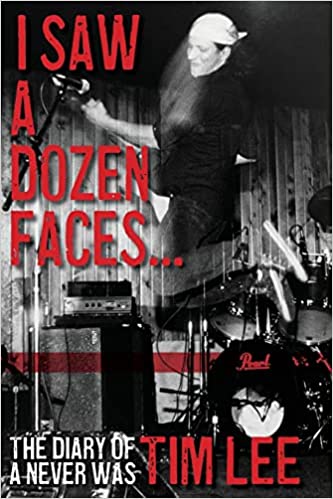
I Saw A Dozen Faces: The Diary of a Never Was
Tim Lee
Cool Dog Sound
Resolute journeyman Tim Lee’s book will resonate with anyone who had teenage dreams of starting a rock band and achieving international stardom. Hopefully before the seventh period bell rings. His story is like many of ours: in high school, you meet like-minded friends, decide to start a band, dream of being rock gods, then fail because all your bandmates are attending different colleges. In college, you meet like-minded friends, form a rock band, get some local attention and play local venues on a Tuesday night, dream of being rock gods, then fail because everyone is graduating and moving on with their new lives. As a young adult you meet like-minded friends, over beers at a backyard barbeque you form a rock band, play some house parties to friends and neighbors, dream of being rock gods, then fail because your first kid is on the way and your pizza delivery income won’t pay for diapers.
Do you see a pattern? Apparently, Tim Lee didn’t, because he kept on plugging away year after year, cranking out some great tunes and critically acclaimed albums that few have ever heard. Even his non-stop touring with the Windbreakers and accompanying other accomplished musicians on stage did not get him invited to join the rock gods atop Mount Olympus. Never came close. Not even close to coming close. So far away.
I Saw A Dozen Faces documents the southern independent music scene from the ’80s and ’90s in a musical memoir written by a survivor who’s been banging his head against the door of stardom for forty years. Here, the underdog doesn’t win, but he doesn’t quite lose, either. Tim comes from a time when a basement full of friends can decide to form a band, play at the local high school dance with their crappy equipment, and really believe they have a shot of playing the big stage alongside their heroes. The punk rock mantra of D.I.Y. finds its way in Jackson, Mississippi when Tim realizes no one is going to make anything happen for him. He has to do it on his own.
Or at least with his best friend, Bobby Sutliff, by his side. These teenaged musical soulmates find two more like-minded kids and form the Windbreakers. But how far can a band go in Jackson? This question pops up in people’s heads in all corners of the South: Chapel Hill, Athens, Oxford. Out of it grows the bands many people from the era are familiar with, and also “the others.” The also-rans. Bands that for whatever reason weren’t named R.E.M., B-52’s or dB’s. The rise of independent record labels fostered that hope of making the big time. Twin/Tone and IRS established the path with Husker Du, The Replacements, and R.E.M. before they moved on to the corporate labels such as Warner Brothers and Geffen. Bands around this time period weren’t thinking about “moving units,” MTV rotation, or even making money. The independent bands around the U.S. weren’t even concerned about playing in tune or singing on key. It was about let’s get on stage, turn up the volume and give these bastards in the audience a show they’ll never forget.
The book tracks Tim’s career from his Jackson, Mississippi high school band, to what would become the Windbreakers and their changing lineups, to his solo work. From impromptu side bands to finally performing alongside his wife Susan as Bark. How he remembers fifty years of memories is a mystery, but he knows every venue, every setlist, every intra-band fight he ever had. These details give the reader a “you are here” feel. You’re with the Windbreakers, traveling long hours in a broken-down van, to play live for thirty minutes in front of four people in Pittsburgh. Then back on the road to Nashville. His stories are funny with a tinge of “oh, so close to stardom” sadness. He maintains a strong work ethic, and more importantly, a positive attitude of non-stop optimism. Surely he’ll break through to national acclaim this time around. Through all the breakups, breakdowns, and payments that just cover the van’s gas bill, Tim remains outside the corporate music business world. His music résumé will make any touring musician jealous. Sharing the stage with those big names of the Southern indie scene. Recording with the best. Playing live at CBGB’s. Getting to live your dream on your terms. But in the end is it worth it? Are you spending decades of your life spinning wheels? As he says, “[h]aving fun is great, but you can’t pay your bills with cool stories. Obviously, I was trying to build a career of sorts, but that couldn’t have really meant much to anybody else, could it?” That line means a lot to those of us who tried to keep our bands alive past high school or college and failed. So what is it all about? Thousands of bands fade into the ether after their first good review or once a song is committed to tape.
As Tim looks into the impending glamour of a monthly Social Security check, he can say it was always about making music and having fun. At sixty years old, he’s ready to jump up on stage, stare back at those dozen faces in the crowd and rock them all.












